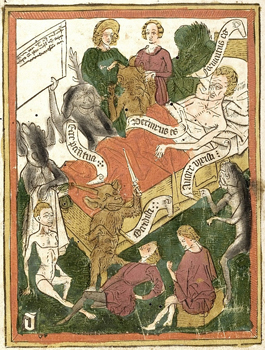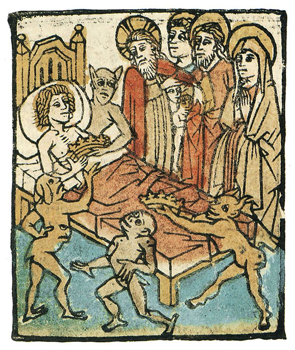To See Death Daily
By Dan Clendenin
For Sunday February 22, 2015
First Sunday in Lent
Lectionary Readings (Revised Common Lectionary, Year B)
Genesis 9:8–17
Psalm 25:1–10
1 Peter 3:18–22
Mark 1:9–15
To "remember death" has always been standard pastoral wisdom in the church. In his famous "Rule," to take one of many possible examples, St. Benedict advised his monks to "see death before one daily."
In the fifteenth century, in the dark shadows of the Black Death and the Hundred Years' War that decimated Europe, a whole genre of literature emerged on "The Art of Dying." These manuals advised readers how to die well, and clergy on how to help them do that. Famous for their woodcuts, they were enormously popular, and lasted into the eighteenth century. One version even went through 100 editions.
Today, things have changed. In 1974 the cultural anthropologist Ernest Becker won the Pulitzer Prize for his book "The Denial of Death."
Similarly, the surgeon Atul Gawande argues that America is a culture in denial about death. Our doctors have reduced death to a "purely medical experience," which in turn does tremendous harm to people. Conversely, says Gawande, acknowledging your mortality is a tremendous gift. It reorders your desires. It narrows your focus, and gives you a new perspective that's rooted in reality instead of vain hope for a medical miracle.
 |
Ars Moriendi ("The Art of Dying"), 15th century. |
This is why Lent is so beautiful and so powerful. Ash Wednesday is that "most honest of days," says Sara Miles, because it's a day when the church reminds us of what our culture denies — that our days are limited, and that we've made a mess of things. The hard truth of Lent is thus a blessing because it deconstructs what Gawande calls "the prevailing fantasy that we can be ageless."
On Ash Wednesday the priest smears ashes on my forehead to remind me of my mortality. To each and every worshipper, one by one, he recites God's words to Adam, “for dust you are, and to dust you will return.” These somber words stand in stark contrast to the archetypal lie that Satan told Eve, and the denial that flourishes today: "surely you will not die!"
And so the Lenten wisdom to "remember death" — memento mori.
Some of our secular saints have arrived at similar conclusions. There's even a contemporary version of the medieval "art of dying" literature.
In his posthumous memoir, the atheist Christopher Hitchens describes his dying days — feelings of impotence, oppression, resignation, unbearable physical pain, humiliation, and vulnerability. He debunks the dangerous illusion that "whatever doesn't kill me makes me stronger." And he meditates on the poetry of TS Eliot: "I have seen the moment of my greatness flicker, / And I have seen the eternal Footman hold my coat, and snicker; / and I am afraid."
 |
Ars Moriendi ("The Art of Dying"), 15th century. |
The novel The Corpse Washer by the Iraqi poet Sinan Antoon tells the story of Jawad Kazim. Jawad is a fourth generation corpse washer and shrouder from a poor Shi'ite family in Baghdad. He tenderly washes and wraps the corpses of the abandoned, the unidentified, and the unclaimed, bodies that are mutilated, decapitated, and burned, plucked from garbage dumps and fished out of the river. Jawad is irreligious, but his vocation forces him to explore questions about life and death.
Then there's Andrew Meredith. After flunking out of three colleges in two years, he took a job as a "remover." For thirty-five dollars a trip, he picked up dead bodies at apartments, houses, nursing homes, or the hospital morgue, and took them to the funeral home. He also worked in a crematorium, where across the years he incinerated thousands of bodies — three hours each at 1900 degrees. Twenty years of life among the dead, he says, provokes a lot of reflection.
Gawande observes how elderly people often shift their life priorities to being rather than doing, to giving rather than getting, to friendships rather than accomplishments, to family rather than work, and so on — a shift that we acknowledge is a healthier way to live. But what accounts for this shift to a better way of living?
According to the Stanford psychologist Laura Carstensen, contrary to what we might think, it has nothing to do with how old you are. Rather, it has everything to do with what perspective you have — whether young or old, the wisest people understand that life is fragile and time is limited.
Her own life is a case in point. When Carstensen was twenty-one, an extended stay in the hospital changed her perspective on life and led to her research on aging. She's concluded that living well depends on your perspective rather than your age. She's conducted numerous experiments that support this conclusion. In other words, a healthy sense of mortality, no matter what your age, reorders your life in a positive manner.
 |
Ars Moriendi ("The Art of Dying"), 15th century. |
We "remember death" in order to affirm life. Meditating on mortality helps me to live more fully in the present moment.
Lent begins on Ash Wednesday, moves toward Good Friday, then culminates on Easter Sunday. From there, as Peter preached in his post-resurrection sermon, we wait "until the time comes for God to restore everything." Thus, Lent is an entirely positive exercise, and believers are the ultimate optimists.
I love Lent. It reminds me that I don't need to be stuck in old ways of thinking and acting. Renewal is possible. I can wipe the mud off my glasses. Hit the reset button. I don't need to wait for old age to magically impart a new perspective on what matters most and why.
This Ash Wednesday, I'll be praying with my friend and poet Brett Foster. After I return home and the cross on my forehead has turned to a smudge, I'll still hope for "those hallowed moments / to be followed by sustaining confidence."
For further reflection:
Brett Foster (1973 – )
Longing, Lenten
The walk back, more loss. When I open the door
it's over, so I set to piddling: tidy
end tables, check the mail, draw a bath.
The restless energy finally settles
as I pass the mirror. I peer into it.
My nose touches glass. Not much left,
already effaced, not even a cross
to speak of. A smudge. A few black soot stains
like pin points on the forehead. The rest
of the blessed ash has vanished to a grey
amorphousness, to symbolize... not much.
Except a wish for those hallowed moments
to be followed by sustaining confidence.
Except spirit, which means to shun its listless
weight for yearning, awkward if not more earnest
prayer and fasting in the clear face of dust.Taken from Jay Hopler and Kimberly Johnson, editors, Before the Door of God; An Anthology of Devotional Poetry (New Haven: Yale University Press, 2013).
References cited:
Sinan Antoon, The Corpse Washer (New Haven: Yale, 2013).
Atul Gawande, Being Mortal; Medicine and What Matters in the End (New York: Metropolitan Books, 2014).
Christopher Hitchens, Mortality (New York: Twelve Books, 2012).
Andrew Meredith, The Removers: A Memoir (New York: Scribners, 2014.
Sara Miles, City of God; Faith in the Streets (New York: Jericho Books, 2014).
Image credits: (1) De.MittelAlter.Wikia.com; (2) Wikipedia.org; and (3) Wikipedia.org.





